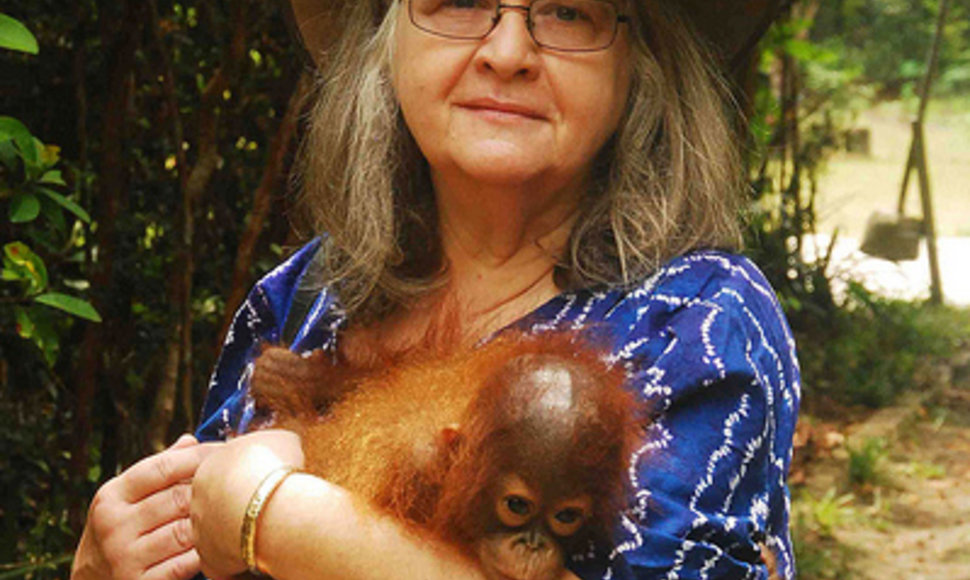She lives part time in Los Angeles, home to the Orangutan Foundation International, teaches a semester every year in Vancouver and lives the rest of the time in Indonesia, where she established Camp Leakey in a Borneo forest nearly four decades ago to help the endangered species.
We’re archiving anything Galdikas feels is relevant - video, audio, images - all of the visual and aural and written research that they view as assets to their work.
Last week, Galdikas swung through Atlanta for a couple of days - her first time in the city in more than 30 years - to participate in events at the Fernbank Museum of Natural History.
Her work - as well as that of elephant conservationist Dame Daphne Sheldrick - bursts from the big screen in the Imax documentary "Born to Be Wild."
As the result of her rescue and rehabilitation efforts, more than 400 orphaned orangutans have been released back to the wild.
Elements of Galdikas’ deep research, including photos and videos, will now be digitally preserved on a private cloud with the help of Atlanta-based Crawford Media Services Inc., a postproduction house that has done similar work for the Dian Fossey Gorilla Fund International, as well as corporate archiving and postproduction work for the TV shows “The Vampire Diaries” and “The Walking Dead.”
Jesse Crawford, president and CEO of the 30-year-old company, is also a former board chair at Fernbank.
“We’re archiving anything [Galdikas] feels is relevant - video, audio, images - all of the visual and aural and written research that they view as assets to their work,” said Steve Carlisle, director of sales and marketing at Crawford. “We think pretty highly of people like Dr. Galdikas. Generations from now, this might be the only way to see an orangutan.”
During her visit to Atlanta last week, the quietly engaging and earthy Galdikas sat at a Caribou Coffee in Buckhead to share her thoughts on “Born to Be Wild” - which just won a Genesis Award, presented by the Humane Society of the United States, for feature documentary (the award show airs on Animal Planet on May 5) - and how everyone can help the orangutan from becoming extinct.
On the finished “Born to Be Wild”
“When movies and documentaries get made, they can get it so wrong, so I was a little concerned when they wanted to do the film. But the producer, Drew Fellman, really has a heart for the orangutans. He really cares for them. The head of Imax suggested that he include elephants, and it’s a much better film with that inclusion, but his first impulse was a film about the rehab of the orangutans.
"When the film opened in Indonesia, he made sure that the world knew that an orangutan [Siswi, the daughter of one of the first orangutans Galdikas cared for] watched the film at Camp Leakey. When the elephants came on, she got apprehensive and at one point went up in her tree to watch. But she was fascinated by the other orangutans on the screen. I’m not sure if she recognized herself, but she certainly recognized the people and the other orangutans.”
On filming the movie
“They filmed us for almost seven weeks. The film crew said it was the most arduous film shoot they ever had. It was unseasonably hot and humid, over 100 degrees.”
On orangutans in zoos
“I’m totally against it, but the problem is, they’re there now. We’re stuck with them. We can’t open the gates and send them out, they’ll get hit by traffic. You can’t really take them back to Borneo, either, because there isn’t enough forest for the natives there.”
On what she’s learned in 40 years of studying orangutans
“They have the longest birthing span, almost eight years [in between pregnancies]. They have very extended life histories. I’ve been in the field four decades, and there are orangutans I’ve met as adolescents and they’re middle-aged now. It’s delightful. Some comedian said life is a series of dogs, so I’m glad that’s not the case with orangutans. I don’t think I could deal with it. It’s nice to go back to camp and see the same ones.”
On what people can do to help save orangutans
“Don’t. Use. Palm. Oil. [The push to create more palm oil plantations is] annihilating the orangutan habitat, and it’s in so many products [from soaps to chips]. And come and visit! Show Indonesians that you value forests more than palm oil.”












